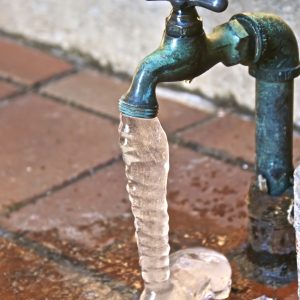 In some areas, the temperature remains fairly even year-round. However, in Utah that’s not the case. Here, we have to take special precautions over the winter to guard our homes and possessions from the freezing temperatures.
In some areas, the temperature remains fairly even year-round. However, in Utah that’s not the case. Here, we have to take special precautions over the winter to guard our homes and possessions from the freezing temperatures.
One of the most important precautions is guarding your pipes against freezing. Frozen pipes can cause costly damage, flooding, and greatly disrupt the healthy operation of your home.
Exterior Pipes
A frozen hose isn’t just dangerous for the hosepipe itself. Frozen water can create pressure throughout the entire system, sending burst pipes clear back into the house. That’s why it’s important to turn off your external water once temperatures start to freeze at night.
The best move for you to make is to simply disconnect the hose from the faucet. Loop it up and stow it in your garage until you need it again in the spring. Many houses also have a safety valve in the pipe leading from inside the house to the external faucet. Shut that valve, and then turn on the exterior spigot until all the water drains out. Lastly, put a faucet insulator on the faucet. These only cost a few dollars, and the protection will be worthwhile. It can also prevent insects and spiders from getting setting up shop inside of your house’s plumbing system.
Exposed Pipes
External irrigation systems aren’t the only things susceptible to freezing. Pipes that are inside the house, but are exposed and in unheated areas (like the garage or basement) can also freeze. Check any pipes that run the perimeter of your home. It’s best to insulate these pipes. Pipe insulation is relatively inexpensive and will protect you from disaster over the winter months. It can also reduce the sounds that pipes make knocking around in your walls when they heat up and contract again, so that’s an added bonus. You might also consider insulating the walls themselves. If there are areas of your house without insulation, you’re losing money on heating and cooling.
If You Leave…
If you plan to leave over the winter for a vacation or for the holiday, take safety measures to ensure that your pipes are okay. You have the option of turning off the water main for a temporary period. This will keep water in your pipes in designated areas so that if there’s damage, it won’t spread throughout the system. After shutting off the valve, drain the pipes by turning on all the faucets and flushing the toilets. You also have the option of keeping your thermostat up even though you’re gone, or asking a house-sitter to run the hot water now and then to keep the pipes heated and active.